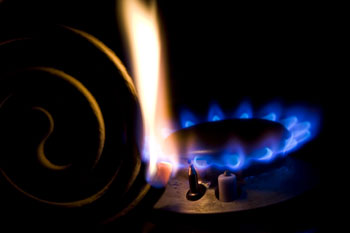Fire Extinguisher : 101
Kitchen Fire Safety 101
| Home |
| About Fire Extinguishers |
| Using a Fire Extinguisher |
| Fire Prevention |
| Fire Hazards |
| First Aid for Fire |
| Financial Protection |
| Biggest Fires in History |
| Firefighters |
This site was voted:

by onlinefiresciencedegree.org
(scroll to 74 on the list)
This article is intended to provide individuals with general information pertaining to kitchen fire safety, causes, safety must-haves, and fire prevention tips. |
One third of all house fires start in the kitchen and are caused by someone leaving cooking unattended or submitting to a distraction while cooking. Appliances used for food preparation have the potential to cause a fire, whether they are electric or gas operated. For example, electrical wires can fray, gas leaks can occur, and inappropriate containers in the microwave can ignite. Knowledge of kitchen fire safety is crucial. This page explains why cooking is the number one cause of home fires.
 It
is important to review the basics of fire prevention now and then. If
your household consists of more than one member, it is a good idea to
gather everyone together on a regular basis to summarize the home’s
fire safety plans, and be sure to include two points of exit from the
house. Although children are taught an escape procedure to follow if a
fire occurs in their school, they should also know what to do in the event
of a fire in their home.
It
is important to review the basics of fire prevention now and then. If
your household consists of more than one member, it is a good idea to
gather everyone together on a regular basis to summarize the home’s
fire safety plans, and be sure to include two points of exit from the
house. Although children are taught an escape procedure to follow if a
fire occurs in their school, they should also know what to do in the event
of a fire in their home.
The Two Basic ‘Must-Haves’
- Integral to kitchen fire safety is having one or more smoke detectors in the house – they can save lives. Install a detector on each floor of the house or apartment, and one in the basement. They should be located close to sleeping areas and near the kitchen so that a cooking fire can be detected in its earliest stage. Fire officials have expressed mixed feelings about battery-operated alarms versus electrical alarms. If the batteries in your alarm have expired, your alarm will not go off; if there is a power failure in your home, your alarm will not function. Always make sure the batteries are working, and never ignore an alarm.
- A functional fire extinguisher in your home is of the utmost importance. It is the ideal tool to put out a fire. Be aware of the operating instructions on the label so you will not be caught having to read them when the kitchen is ablaze.
Tips on Kitchen
Fire Safety
Extra
care should be taken when working in the kitchen in order to avoid the
onset of a fire. Here are some safety tips:
- Wear appropriate clothing, and avoid the long, flowing sleeves and open, loose-fitting shirts that can easily come in contact with hot burners.
- Wear your long hair up and do not leave any strands hanging.
- Never take your eyes off hot oil because it can ignite in an instant. If it catches fire, immediately place a cover on the pan.
- Always unplug electrical cords from all ancillary appliances. A plug can ignite even though the equipment is turned off. Any power surge or unforeseen problem with electricity can cause a fire.
- Do not use electrical appliances near water and keep cords away from all heat sources.
- Turn pot handles inward on the hot stove so as to avoid bumping into them accidentally and spilling their contents.
- Do not place potholders, boxes, towels, cutting boards, or plastic utensils and containers near cooking areas.
- Keep the kitchen work area clean, free from grease and burnt food. If you have a self-cleaning oven, remove large debris before turning it on.
- Keep a box of baking soda on the kitchen counter while cooking as it can quickly put out a small kitchen fire if it is caught at its onset.
- Make sure all appliances are in good working condition. At the first sign of a problem, have it fixed or get rid of it.
Getting
Out Quickly
In the event of a fire, do not spend a significant amount of time attempting
to put it out. Get out first, then call 911 and give them your complete
address, the phone number you are calling from, the location of the fire,
and inform them as to whether or not anyone is still inside the house.
No matter the reason, never go back into the house until it has been declared
safe by the fire department. If you have any further questions with regard
to kitchen fire safety, contact your local fire department and ask for
guidance.
Written by
John Manley
Having experienced 2 house fires, John Manley now devotes some
of his spare time educating people about the importance of having fire
extinguishers, CO and fire alarms, and proper escape plans though the
website: Fire Extinguisher:
101 - www.fire-extinguisher101.com.